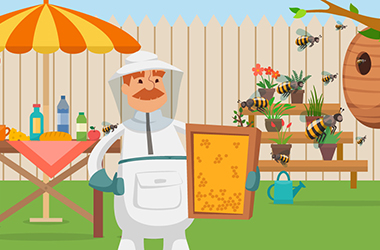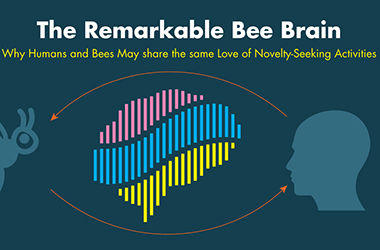
As backyard entertaining brings the indoors outdoors this summer, your backyard or pool deck may play host to quite a few cookouts and pool parties.
As backyard entertaining brings the indoors outdoors this summer, your backyard or pool deck may play host to quite a few cookouts and pool parties. But sometimes, uninvited bees or wasps can disrupt summer fun activities. Because bees and wasps pose health threats to humans and pets, Truly Nolen recommends contacting a reliable and reputable professional pest control company to address your bee and wasp concerns.
Also, with the sudden threat to honeybee populations worldwide, the thought of relocating a bee colony to an apiary may sound like a good idea to environmentally-aware homeowners but in Modern Farmers interview with Reed Booth, Southern Arizonas Killer Bee Guy, Booth said beehives and nests found under eaves, in walls, in sheds and other places on homeowners properties should be eradicated as most wild bee colonies in the US have become Africanized. This means that due to the interbreeding of wild European honeybees with wild Africanized honeybees, the bees are much more aggressive and will attack people and pets. Pest professionals, such as Truly Nolen, know how to remove killer bees from your property, safely.
As the globes most important plant pollinators, honeybees play a vital role in contributing to over one-third of the planets food sources. Pollinating US crops at an estimated 10 billion dollars worth annually, honeybees produce honey collected from flower nectar. Bees depend on the honey they produce from flower nectars to nourish their young and provide sustenance for adult bees. While professional honey collection by beekeepers provides us with honey, beeswax, pollen, propolis and royal jelly, beekeeping is a highly specialized enterprise, conducted by trained apiarists.
A honeybee colonys highly sophisticated and social structure includes individuals performing specific tasks for the ultimate good of the colony. Divided into three castes, honeybee colonies consist of one queen, 20-80 thousand infertile female worker bees and 300 to 800 fertile male drones, whose only job description appears to be mating with the queen to produce more bees. Along with the adult bees, honeybee colonies also include about 500 eggs, along with 25-30 thousand immature bees in various stages of development, according to The Food and Agriculture Organization of the United Nations website.
In familiar honeycomb-shaped nests, with their signature hexagonal shaped cells, worker bees raise the next generation of worker bees, in smaller cells at the bottom of the honeycomb. The upper, larger comb cells store pollen and honey to nourish the colony.
Sometimes nests require the construction of queen cells devoted to raising queen bees.
Even though they will never mate, the workers, do however possess organs necessary for carrying out the many duties essential to the wellbeing of the colony, says the FAO website article. Worker bees come equipped with:
Additionally, sterile female adults perform the bulk of the work in a bee colon. As immature bees, worker bees take care of the queen and the brood, performing these tasks and many duties inside the nest as house bees, including:
Executions may be performed to eliminate strange bees, to kill or drive away old and sick bees, to discourage other hive predators from entering the hive, to remove sick or unwanted unemerged brood, to eliminate useless drones, and to kill unwanted or strange queens.
As the FAOs info on bees and wasps shows homeowners, bees and wasps do not play. Theyre all business. The survival of a bee colony relies on delicately balancing a multitude of factors. For the good of the colony, bees and wasp will kill members of their own colonies, including their queen in order to maintain optimal hive conditions. In light of this information and observations, homeowners should steer clear and avoid attempting to remedy the problem on their own. Instead, homeowners should contact their local Truly Nolen locationto schedule a free bee or wasp inspection, when bees and wasps move too close to human and pet living areas.
Entertaining outdoors can be a whole lot of fun this summer, without the threat of bees ruining your outdoor events. Contact Truly Nolen for all of your pest control concerns!

As backyard entertaining brings the indoors outdoors this summer, your backyard or pool deck may play host to quite a few cookouts and pool parties.

Bee adventurers go the extra mile for the survival of their colonies. In bee hives, only certain bees leave hives to hunt for new food sources and to find new accommodations once populations outgrow their current hives.